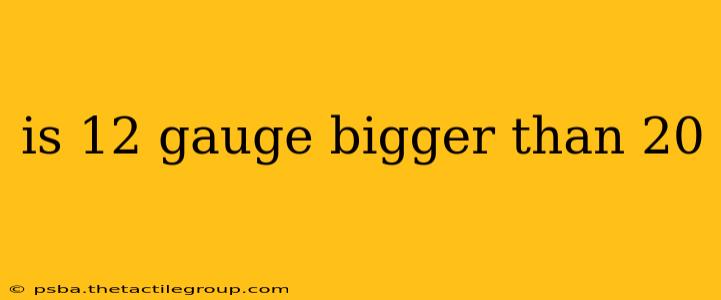The simple answer is yes, a 12-gauge shotgun shell is bigger than a 20-gauge shell. But understanding why this is true and what the implications are for shooters is crucial. This post will delve into the specifics of shotgun gauge, explaining the sizing system and its impact on the power and application of different shells.
Understanding Shotgun Gauge: It's All About the Lead
The gauge system for shotguns might seem counterintuitive at first. It doesn't directly measure the diameter of the shell; instead, it reflects the number of lead balls, each with a diameter equal to the bore diameter, that would weigh one pound. Therefore, a lower gauge number indicates a larger diameter barrel and shell.
- 12 Gauge: Twelve lead balls, each the diameter of the barrel, would weigh one pound.
- 20 Gauge: Twenty lead balls, each the diameter of the barrel, would weigh one pound.
Since it takes fewer 12-gauge balls to equal one pound, each individual ball (and thus the barrel bore) must be larger. This directly translates to a larger shell capable of holding more shot or a single slug.
Key Differences Between 12 Gauge and 20 Gauge
The size difference between 12 and 20 gauge has several significant consequences for shooters:
Shell Size and Capacity:
- 12 Gauge: Larger diameter means more space for shot, resulting in a greater payload. This translates to more pellets per shell and consequently, greater striking power at range. They also typically hold larger slugs for hunting larger game.
- 20 Gauge: Smaller diameter and payload result in less recoil, making it more manageable for beginners or younger shooters. While less powerful overall, it's still effective for hunting smaller game and target shooting.
Recoil:
- 12 Gauge: The significantly larger payload results in a noticeable recoil. This can be fatiguing for extended shooting sessions and requires proper technique to manage.
- 20 Gauge: Reduced recoil makes it more comfortable to shoot, allowing for quicker target acquisition and follow-up shots.
Applications:
- 12 Gauge: A versatile choice for hunting a wide range of game, from waterfowl to deer (depending on the load), and for home defense. Its power and stopping ability make it a popular option.
- 20 Gauge: Often preferred for smaller game hunting, clay target shooting, and by those seeking a lighter recoiling experience. Advances in ammunition technology have made 20 gauge more effective on larger game than previously thought possible.
Availability and Cost:
- 12 Gauge: The most common gauge, readily available in various loads and at a competitive price.
- 20 Gauge: While widely available, it might have slightly less variety in ammunition types compared to 12 gauge.
Conclusion: Choosing the Right Gauge
The "bigger" 12 gauge packs a more powerful punch, making it ideal for situations requiring stopping power and range. However, the more manageable 20 gauge provides a lighter recoil, appealing to those prioritizing comfort and quick follow-up shots. The best choice ultimately depends on individual needs, experience level, and intended application. Consider your shooting style and purpose when selecting between a 12-gauge and a 20-gauge shotgun.

